Peter MALONE
Saturday, 18 September 2021 19:22
Dead Trouble
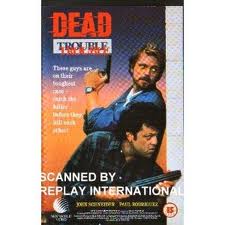
DEAD TROUBLE
US, 1989, 90 minutes, Colour.
John Schneider, Paul Rodriguez.
Directed by Bill W. Norton.
Dead Trouble is a routine but glossy action thriller, a star vehicle for John Schneider (Dukes of Hazzard) and comedian Paul Rodriguez. It is about two bail bond bounty hunters, their trying to track down a Mexican gangster, the difficulties, action in San Diego and Mexico. The material is familiar, the action highlighting macho styles - but with tongue in cheek. The film was directed by Bill W. Norton, director of many telemovies from Gargoyles to feature films like More American Graffiti.
1. Entertaining action comedy thriller? Bail bondsmen and bounty hunters? The world of drug dealing, police?
2. The Californian Mexican locations, San Diego, Tijuana? The Mexican border? The action sequences? Stunts and special effects? Fights, shoot-outs? Car chases? The musical score?
3. The title - conventional title for this kind of material?
4. John Schneider as Hardball, his baseball career, police, bounty hunter? The initial skill in using the baseballs to down his victims? The dangers, his success? Serious and taciturn? The big job, meeting Gomez, their rivalry? Fights, outwitting each other? The decision to work together? Tracking down Miguel, meeting Anne - and the baby? The dangers, the fights? Protecting Anne from Aguillar? The taking of the baby? The pursuit into Mexico, the drug dealer? The confrontation, the shoot-out? The death of the boss? The pursuit of Aguillar? The baseball and the rescue? The attraction towards Anne? Gomez, his background, his tracking down people, the comic touches? His character, clashes with Hardball? Combining with him? Their trying to outwit each other?
5. Anne, the baby? Her husband, death? The money and the artwork? The taking of the baby? Taking the law into her own hands? The police? The dangers, the confrontation?
6. Aguillar and the drug dealers, brutal murders? The taking of the baby? Across the border? The shoot-outs, the confrontation, the shooting of the boss?
7. The world of drug dealing on the Mexican border? Dirty money? Criminals, the police? The bail bondsman? The bounty hunters - and the tradition of the American frontier, law and order?
Published in Movie Reviews
Published in
Movie Reviews
Tagged under
Saturday, 18 September 2021 19:22
Dead on Time

DEAD ON TIME
UK, 1992, 105 minutes, Colour.
John Thaw, Kevin Whately, Joanna David, Samantha Bond, Adrian Dunbar.
Directed by John Madden.
Dead on Time is a very entertaining Inspector Morse case. The film begins with what seems like a suicide - and later emerges as a murder. It focuses on a terminally ill man, his wife who was previously engaged to Morse. Morse becomes more than personally involved in the case, missing the clues that Lewis is able to investigate - but who then decides not to point out to Morse, in sympathy with his grief and involvement. The film also raises the theme of euthanasia, associations for promoting euthanasia, the role of doctors. The film has some nice complications with subplots of fidelity and infidelity. (Adrian Dunbar, the writer and star of Hear My Song, is featured as the doctor sympathetic to euthanasia.) John Madden went on to direct Shakespeare in Love and Captain Corelli's Mandolin.
1. The popularity of Inspector Morse telemovies? The quality of the cases and the police investigation? The personalities of Morse and Lewis, their working together, their clashes?
2. The Oxford settings, the city, the colleges, the surroundings, homes? Morse's atmosphere? The musical score?
3. The title and its ironies? The phone out of order, the absence of possible murderers except for the son-in-law? The arranged suicide? Euthanasia?
4. Henry, the fixing of the phone, his disabilities? Calling his wife? His death? The phone call to his son in-law and his son-in-law's presence? Suspect?
5. The background of Henry, his career, illness, interest in euthanasia? His love for Susan, her career as a lecturer, her absence in London? The background of her relationship with Morse? Meeting him again, sharing experiences with him? The possibility of the relationship being rekindled? The memory of their dead daughter and her child? Their resentment of Peter Rhodes, their son-in-law? Yet Henry setting him up in business, his alcoholism and his reform? The money loans - and the bank's foreclosing?
6. Peter Rhodes, the background of his story, his infidelity to his wife? His drinking? His being the suspect? His declaration about the phone call at 3 o'clock? In prison? His relationship with Helen Marriott? Morse interrogating her - and the flashback, his drinking, the break with his wife, in the car, their fight, the crash, his surviving?
7. Dr Marriott, his suggestion that the death was not suicide? The bequest for his society? Family doctor, his relationship with his wife, tensions? His support of Susan? The revelation of the plan, his trying to persuade Susan not to kill herself? Morse's animosity? His return to the flat to get the answering machine tape?
8. Helen Marriott, tension with her husband, working at the clinic? Her liaison with Peter Rhodes? In the church, her discussion with Morse? Her telling him the truth? Her selfishness, blaming herself?
9. Susan's brother, the exercise horse, the spoof on English pomposity? His helping Morse? Grief at his brother-in-law's death? His contribution to the case? The sadness at his sister's death?
10. Morse and the investigations, the interrogations? The help from Susan? The phone company, the nurse? The open curtains? Lewis and his investigations, clashes with Morse, supporting him? The realisation of the truth, finding the answering machine tape, wanting to explain it to Morse, Morse misunderstanding him? His deciding to throw the tape away?
11. An interesting example of detection, police investigations? Bitterness and revenge in death? Euthanasia? Medical ethics?
Published in Movie Reviews
Published in
Movie Reviews
Tagged under
Saturday, 18 September 2021 19:22
Dead Solid Perfect
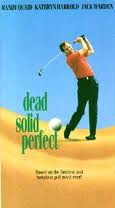
DEAD SOLID PERFECT
US, 1988, 82 minutes, Colour.
Randy Quaid, Kathryn Harrold, Jack Warden.
Directed by Bobby Roth.
Dead Solid Perfect is a home box-office telemovie. It is a golf story. Randy Quaid gives a strong performance as a self-willed golfer whose life is in a mess. A conman playing for money, he is persuaded to go into tournaments - and progresses to victory. He also has to cope with his womanising, the collapse of his marriage and his rediscovery of the possibility of commitment.
The material is fairly conventional - and the audience knows that the hero will eventually win. He is off-putting at the beginning with his foul mouth and unprincipled behaviour. However, as in so many of these films, he discovers himself and transcends his past. Kathryn Harold is his wife. Jack Warden appears as a bigoted entrepreneur.
1. Interesting sports story? About a sportsman? His crisis?
2. The American backgrounds, the cities, the golf circuit? The affluent world of the professionals? Their backers?
3. The title, the reference to golf games and winning?
4. The portrait of Ken? His friendship with Spec, his training with Spec? The game with Bad Hair? His being found out? Going on the circuit, the dinner with Bad Hair and his family - and their bigotry? His unwillingness to speak out? His relationship with Beverley, love for each other, her not finding the golf circuit possible for her? His ignoring her and her interests? Their separation? His going on his way, his friends amongst the golfing professionals, successful play, Spec helping him, Bad Hair supporting him? His relationship with Janie? Encountering Beverley and her friend at the hotel, the war of words? His being upset in his game by his emotional problems? Beverley's operation, his going to the hospital? Seeing the video of Janie and Donny? His play, erratic, improving, Spec's support, his win? Beverley's presence? The possibility of a new life?
5. Spec, his friendship, support? Ken allowing for the bigotry of the wealthy? Yet Spec being his friend?
6. Beverley, the quality of the marriage, her love for Ken, her difficulty with the golf circuit? Her friends? The bigotry of the dinner and her speaking out? The separation? The doctor friend? Her encounter with Janie and her sarcasm? The operation, the meeting with Ken? Her recovery, present at the golf course?
7. Bad Hair, the initial game, his attitude, his wife? His referring to blacks as ethnics? Anti-Jewish? A caricature of bigotry? His family at the meal? Ken saying that he could not change? Beverley's walking out? Financial investment, supporting Ken?
8. The gold professionals, their skills, the games, competitiveness? Personal relationships?
Published in Movie Reviews
Published in
Movie Reviews
Tagged under
Saturday, 18 September 2021 19:22
Dead Ringers
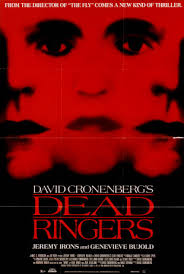
DEAD RINGERS
Canada, 1988, 115 minutes, Colour.
Jeremy Irons, Genevieve Bujold.
Directed by David Cronenberg.
Dead Ringers is an art-house science fiction film. It has a touch of horror from David Cronenberg (The Brood, Scanners, Videodrome, The Fly). Most audiences will probably be confused, bored (or both). But Cronenberg is very serious. This is a story of identical twins, played intensely and with subtle distinctions by Jeremy Irons. Innovative doctors in gynaecology, they have celebrated careers. But, this is the story of their decline, the impossibility of true individuation, the need for each other and the need for separating.
It is a long, brooding film that requires concentration in an attempt to know who is who and what is happening to each of the twins. It delves into the mythologies of identity and personality evocatively.
1. The films of David Cronenberg? His interest in the human psyche? Scientific and technological background? Psychology and symbols?
2. The use of Toronto, the city, apartments, hospitals? Authentic atmosphere? The special effects, the artwork? The dreams and the effects? Musical score?
3. The title, the reference to twins? Images during the credits and the end? The discussion about the first Siamese twins and their deaths? Identical twins - how close the identity? Names? (Masculine and feminine?) Identical look, behaviour? Knowing and feeling together? Complementarity? Need for each other? Collapse of one, collapse of the other? Death?
4. The prologue and 1954, the twin boys, their talk, sexuality and science and the sea? Propositioning the girl? The operation game and their experiments, developing the equipment?
5. 1967 and their study in Boston, the operations, the development of the equipment, professional jealousy and reactions, the awards, the gold piece? One, the extrovert, accepting it, the other, the introvert, at home.
6. 1988: their age, experience, skills, reputation, the blend of research and action? The introvert and the extrovert? Living together, interchangeable? The jokes about their identity? Sexual relationships and interchange? The audience puzzled - which is which?
7. Claire and her gynaecological examination, her hopes for a child, mutant characteristics and pregnancy? The talk about women changing, genetic upsets, operations, reality and dream? Beverley talking to Claire's secretary about gynaecology and her mutant situation? The artwork, the stealing of it, the comment on evolution and change? Mutation?
8. Claire as the film star, the mini-series, her hopes, the examination by Beverley, the dinner with Elliott? Beverley's return, the affair, the sensuality, the effect of each on the other? Her realising some kind of schizophrenia? Elliott casual, Beverley intense? Her relationship, the change, meeting the two, her reaction and spurning Beverley? Elliott going after her but not going? Beverley weeping?
9. Beverley's going downhill after the relationship with Claire? Frustration, the younger brother, the introvert? Seeing Claire, her taking of pills, his growing dependence and drug addiction? The dream of Elliott and Claire biting the twins free? Her loving him or not? His jealousy? The phone call and talking to her secretary, his anger, taking more pills, collapse? His performance at the award night? His speech and the talk about sexuality and exploitation? Elliott taking care of him? The conversation about the deaths of the Siamese twins?
10. Elliott as extroverted, the grants and awards, his girlfriend? Taking or leaving relationships? Not taking drugs? His care for Beverley? His going on tour, his lectures and philosophy of medicine? Experimentation? His standing in at the operation and collapsing? The accountability to the board? The warnings of his girlfriend?
11. Beverley ringing Claire, her return, going to see her, his getting out, using the security man to unlock the door? His vomiting in the street, the art exhibition and his stealing the implements? Going to Claire, the collapse? Her questions?
12. Elliott and his own collapse, empathy with Beverley, the drugs? Needing Beverley for his career as a speaker, Beverley's research?
13. The two walking the apartment identically, the drugs, the build-up to the killing of Elliott, Beverley and his surgery? Going out, the phone call to Claire - "Who is it"? His return to the apartment, the two joined in death, designed in death like Michelangelo's Pieta?
14. How realistic was the plot and characterisation? How dramatic? Symbolic? Myths about twins, identity, individuation? Psychic identity, consciousness? Evolution? A satisfying dramatisation of symbolic mythology?
Published in Movie Reviews
Published in
Movie Reviews
Tagged under
Saturday, 18 September 2021 19:22
Dead Reckoning

DEAD RECKONING
US, 1990, 90 minutes, Colour.
Cliff Robertson, Susan Blakely, Rick Springfield.
Directed by Robert Lewis.
Dead Reckoning is a glossy telemovie thriller for wide audiences. It focuses on a glamorously evil woman played effectively by Susan Blakely. Cliff Robertson is her older wealthy husband. Rick Springfield (perhaps better as a singer than an actor) is the lower-class love interest. Most of the action takes place on a yacht during a storm and a remote island with an ominous lighthouse. It is a variation on the lives of the rich and famous and sexual and violent intrigue. There is a twist at the end which reveals Blakely as a completely manipulative and evil woman. Glossy paperback style entertainment.
1. Enjoyment of this kind of glossy melodrama? Crimes of passion? In the world of the rich and famous?
2. The affluent world, mansions, yachts, islands? Special effects for the yacht, the storms? Musical score?
3. The title and its ironies, themes?
4. Alex, the arrest at the beginning, the flashbacks, the finale with the audience knowing more about her? Loss of sympathy for her? Her background, marriage to Daniel, the pre-nuptial clause? The party for his birthday, the gifts? Her behaviour at the party, sexual attraction, relationship with Daniel? The gift of the yacht, Kyle on board? The beginning of tensions? Her reaction to Kyle, to Daniel, the danger of the storm? Daniel's suspicions? Going onto the island? The night, the sexual encounter with Kyle? The lies to Daniel? Inciting Kyle, Daniel's death, her role-playing and lies? Going onto the yacht, writing the note, the Coastguard and the rescue? Her attempt to strand Kyle, his return? The confrontation, his death? The attempts to cover up - and the interrogation by the police, the Coastguard, the inconsistencies in her story, the arrest?
5. Daniel, wealthy surgeon, marrying the younger woman, the sexual attraction? Suspicions? The birthday party, the gift of the yacht? His diary and the growing suspicions? The clash with Kyle, fixing the yacht? The night before is death, the diary? The murder?
6. Kyle, his background, attracted to women, the gossip at the party? On board the yacht, the clashes with Daniel? The clashes with Alex? The storm, steering the yacht? On the island, settling in? His encounter with Alex, the deception with Daniel? Murdering him? Going down the rope - and Alex taking the rope? The climb, the confrontation? The violent encounter and his death?
7. The crime of passion, the political intrigue - the personality of the senator, the sexual liaison with him? His power play - and yet, with the deaths, his putting Alex at a distance?
8. Crime, justice?
Published in Movie Reviews
Published in
Movie Reviews
Tagged under
Saturday, 18 September 2021 19:22
Dead of Winter
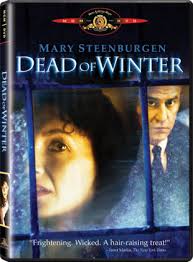
DEAD OF WINTER
US, 1986, 100 minutes, Colour.
Mary Steenburgen, Roddy McDowell?, William Russ, Jan Rubes.
Directed by Arthur Penn.
Dead of Winter is a stylish thriller, mystery directed by Arthur Pen (Bonnie and Clyde, Little Big Man). It is also a tour de force for Mary Steenbergen as the put-upon heroine as well as playing nasty twins. Jan Rubes is the mad psychiatrist who persecutes her with the assistance of an eccentric Roddy McDowell?. There is a mysterious prologue, a focus on the heroine, putting her in a situation of danger, persecution, the police not believing her, then her getting the upper hand. The film relies on atmosphere and characterisation - though it has its moments of menace and violence. Enjoyable of its kind.
1. Interesting thriller, murder mystery? Stylish thriller?
2. New York settings, upper New York State, the winter both inside and outside the house? Musical score?
3. The title, its ironies?
4. The prologue, the woman and the robbery, her being killed, her finger cut off?
5. Katie and the advertisement, her relationship with Rob, with her brother? Tensions? Going to the audition, waiting, chatting? The meeting with Mr Murray, her reading, his choice? The decision to go? Rob taking photos? The drive, the winter, the garage and the gift of the goldfish?
6. Dr Lewis, chair-ridden, a psychiatrist, his film interests, the set-up, pleasant, Mr Murray and his kindness, the hot milk? The video, the set-up and the performance?
7. Mr Murray taking the video to the sister, her believing it, the blackmail plan, the consequences?
8. Katie's suspicions? The development of her character, the drugs, the phone cut off, noticing the card in the fire, the injections, the cutting off of her finger, the terror, the dead body and the mouse, the phone calls? The police and their arriving, her hysteria and not believing her? the corpse on the bed? Atmosphere of menace?
9. Dr Lewis and Mr Murray, Evelyn's arrival, her haughty attitude, Katie's escape, the search outside, inside, the fight with Evelyn and taking her place? Her acting, the taunts of Mr Murray, her killing him? Lewis searching the house, the chase, his pursuing her upstairs, seeing her in the mirror, attacking the corpse, her stabbing him, his foot in the trap?
10. Rob and her brother and the police, the search, the goldfish - the rescue?
11. Katie and the experience, the effect on her?
12. The plausibility of the plot, the psychiatrist and his patient, his greed, the police, the attitude towards the two women? A satisfying thriller?
Published in Movie Reviews
Published in
Movie Reviews
Tagged under
Saturday, 18 September 2021 19:22
Deadly Sins
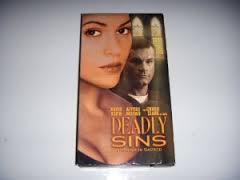
DEADLY SINS
US, 1995, 90 minutes, Colour.
David Keith, Alyssa Milano.
Directed by Michael Robison.
Deadly Sins is a potboiler set in a girls' school and an isolated convent. Girls are disappearing, there is a sinister superior. David Keith is the rebellious policeman who is sent to be the local authority. Alyssa Milano is the superior's secretary, but really a private investigator. There are the expected clashes, sexual tensions, mysterious murders - and a culprit who is not too difficult to work out.
1. Entertaining potboiler? Murder mystery? The touch of the exotic with the religious overtones and the convent?
2. The island setting, its beauty? Isolation? Musical score for this kind of thriller?
3. The title - the reference to confession, the villain overhearing the confessions, the guilt and innocence of the girls? Her own guilt?
4. The use of religious symbolism? The convent, the nuns and their old-fashioned habit? Religious ceremonies, the singing of hymns? The chaplain? The prayers? The girls studying Latin? Crucifixes and crosses? The chapel?
5. The basic situation: the girls as orphans, disappearing, the girl hanging with the cross on her stomach? The pursuit of the other girls and their killings? The investigations? The dangers?
6. Jack as the investigator, his rebellious background, ex-wife, coming to the island? The laid-back approach? The doctor? His interrogations, the attraction of Cristina? The ambiguity of her being a nun? The discussions with the superior? Keeping guard, protecting the girl who fell in the open grave? With Rita at the hotel? The confrontations, the dangers, Emily? The happy ending? A rugged policeman?
7. Cristina, as the superior's secretary, helping with the investigations, the interrogations? The attraction to Jack? The revelation that she was a private investigator? The final confrontations and dangers?
8. The doctor, the vet, laid-back, police information, coroner's report? His presence in the school? Suspect?
9. Father Anthony, his intellectual background, at the school? Ceremonies? Choir? His secrecy with the superior? Hearing confessions?
10. The superior, her married background, joining the convent? The devotion to Mother Bernadette? The secrecy? The mystery about Mother Bernadette's presence? Her discussions with the investigator?
11. The townspeople, their hostility towards the nuns, the convent, wanting the convent to become a tourist resort? Their suspicions?
12. The girls at the school, Beth and her provocation, with Eric the delivery boy? The murdered girls? The Latin classes? Jack investigating the background of the teacher, his guilt? The suicide of the girl?
13. The contrived situations - suitable for this kind of easygoing potboiler?
Published in Movie Reviews
Published in
Movie Reviews
Tagged under
Saturday, 18 September 2021 19:22
There Were Days and Moons
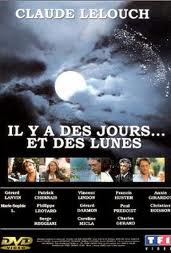
THERE WERE DAYS AND MOONS
France, 1989, 117 minutes, Colour.
Gerard Lanvin, Vincent Lindon, Annie Girardot, Francis Huster, Philippe Leotard.
Directed by Claude Lelouch.
There Were Days and Moons is the 31st film by French writer-director Claude Lelouch. Lelouche won international fame and an Oscar for the 1966 classic A Man and a Woman. It set the tone of Lelouche's career, lush romantic stories with glossy style for the popular audience. This 31st film is in the same vein.
There is a long prologue in Normandy, commemorating D- Day and the 45th anniversary celebrations. We are introduced to two characters and a wedding. Then come the credits and a focus on the beginning of daylight saving and the effect of a full moon in summer. Lelouch interprets it as a kind of fate and governing behaviour even to some madness. A whole range of characters are introduced and glimpsed throughout the film, the prediction of a death in 18 hours, and the inevitable coming together of all the characters in the death sequence. Complex, sometimes difficult to follow, the film nevertheless engages its audience in the variety of characters and their interactions. The film has the glossy style that audiences have become used to from television series and mini-series. It is very Gallic in its tone both of charm and fatalism.
1. The work of Claude Lelouche, the Gallic touch, interest in people and relationships, fate? His glossy and polished style?
2. The impact of the Normandy prologue, 1944, the re-enactment in 1989, the memories of the liberation? The beauty of Normandy, San Michel and other locations, the coast? The mood? The celebrations, the young people, the romance, falling in love, their interviews? The Paris locations, the suburbs? The detail of homes, the restaurants, the roads? The score?
3. The title, daylight saving, the full moon, madness? The nostalgic tone of the title, memories, reality and fantasy? The songs and their lyrics - especially the title song sung by the two singers at each end of the wedding table?
4. The Normandy setting, the falling in love, the romantic love at first sight, the interviews, the marriage - and the initial tensions, breakdown and clash?
5. The credits, the feast, the aftermath? The interview with the old man? The song and its lyrics? The transition to the composer, his melancholic and pessimistic song? His face in close-up and the window and the rain? The prediction of a death?
6. The intercutting of the range of characters, their connections, relationships, affairs? The transition to the road, traffic, confrontation? Moods?
7. The singer, alone, his melancholy, drinking, talking to the hotel maid - and her naive listening, girlish response? Sleeping it off, appreciation for the maid, the encounter with the couple having the affair, the offer of the taxi, flying to Rio - and booking his return?
8. Sylvain and the tension in his marriage, his wife leaving? His wanting to sell the restaurant, the cook and his anger? The staff? Sylvain and the relationship with his daughter, his delight with her, tiding over her mother's absence? The later phone call from the wife, going to the phone box, the wager with the stone - and the wife losing? The staff, their work, energy, clashes? Their enjoyment of the night - dancing with the couple rehearsing their numbers? The elderly woman, her memories, her dead daughter? Working, talking - with Sylvain, playing with Salome? Performing in the play with the priest and Salome? The couple with the dance rehearsals, their enthusiasm? Everybody joining in the dancing? Memories, happiness? Facing a future - the client wanting to buy the restaurant? Salome and her frank talks with her father, especially about sexuality? Their all assisting in the violent incident?
9. The lawyer, losing his cases, his pregnant wife? Her going to the airport, her work, the daylight saving and the cantankerous passenger who missed his plane, the sympathetic passenger? Her lover, his marriage, working in the first aid, the anger of the man injured, sewing him up, confiscating the knife? The end of the affair, going to the hotel, the break-up, the singer with the taxi? In the traffic jam, the angers? The final confrontation and the knife attack? The future of the man and the woman?
10. The filming of the cars, Gerard driving them away, driving on the roads, the clash with his wife, the daylight saving and his making the mistake? Leaving the cars, taking one, picking up Caroline - the memories of her wedding, the clash with her husband, wanting to go for the honeymoon by herself? The brutal treatment in the truck? Hitching a ride, Gerard and her realising the truth about his taking the car? His speed, the fears? The ambulance and their following it? Following the ambulance, the confrontation, the angry exchange, Gerard's desperation, the fight, the stabbing - and his assailant trying to ease him with breathing in his death?
11. The priest, role in the parish, acting, concern about mass, the confession - and the comments that he was homosexual? The relationship with the furniture dealer? With the pianist? The pianist, his compositions, the breaking of the affair? The priest and his assisting with the death?
12. The composer, his music, relationships?
13. The parents at the restaurant, the game of their meeting and flirting? Their pregnant daughter and her affair? The play and the wife's success? The daughter going to visit them - and the setting for the accident?
14. The travelling cabaret, their singing, performance, street theatre? Costumes, styles? The encounter with the police - and challenging him to drive the bus? His exhilaration - and challenging the next policeman? Their presence at the death, their song?
15. The overall impact of a day and a half in the life of a cross-section of French people? Their behaviour, relationships, destiny? The dialogue and its focusing on the influence of the moon?
Published in Movie Reviews
Published in
Movie Reviews
Tagged under
Saturday, 18 September 2021 19:22
Deadly Medicine
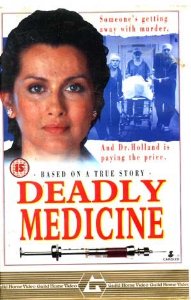
DEADLY MEDICINE
US, 1990, 89 minutes, Colour.
Veronica Hamel, Susan Ruttan, Stephen Tobolowsky, Scott Paulin.
Directed by Richard A.Colla.
An interesting telemovie, a star vehicle for Veronica Hammil who produced the film. Veteran Richard Colla directed.
The film was allegedly based on a true story, focusing on a paediatrician, her lack of experience, her friendship with a nurse and the revelation that the nurse was psychotic and had been murdering children. The Doctor becomes a victim, attacked by every one in the small town, under threat from the District Attorney, becoming more and more estranged from her husband till finally she is left alone.
Veronica Hamel is a strong screen presence. Stephen Tobolowski has an opportunity to be harsh and sympathetic as the District Attorney.
1. Interesting and entertaining telemovie? The world of medicine and doctors? Murder?
2. Texas settings, the Austin Hospital, the country town, the building site, the paediatrician's office, District Attorney's office and courts? Musical score?
3. The title - straightforward, focusing on the care of children, Janine Jones' murders?
4. Kathleen Holland, her success in her work, relating to people at the Hospital? Care of children? Friendship with Janeen, inviting her to assist her in her practice? Her love for her husband, the building site, building the new house? A new beginning? In the town, her work, the child with the convulsions, healing the child, the child's death? The grief and the funeral? Police suspicions, evidence of the overdose of the drug? Suspicions on Kathleen? Victim, handling the situation, the anguish? Support of her husband, their discussions, his growing alienation and final departure? Her selling the house? The District Attorney and his suspicions, aggression? The advice of her lawyer to avoid answering? The town's suspicions, the parents turning against her? Vandalism? The discussions with Janine, the realisation of the truth? Janine and her madness, her blackmail? The good impression that Janine made at the investigations? The discussions with Sottom, persuading him to go to the hospital in Austin, the discovery of the truth about the record number of infant deaths? The fact that the Hospital had offloaded Janine to Kathleen? The court case, needing the day book as evidence? The defence of Janine and his emotional appeals? The parents and their evidence, using it in court? Janine's outburst? The anguish of waiting for the jury's decision, the phone coffin Charlie? Her vindication - a future, the bond with Sutton?
5. Janine, her work, devotion to the children? Kathleen's offer, her deciding to go? Her relationship with her own children? At work? The realisation that she had killed the children, her madness, shrewdness in answering questions? The confrontation with Kathleen and her hatred? Making good impression, answering the questions plausibly, her suicide attempt - and allegedly covering up for Kathleen but blaming her? The court case, her performance? Her final outburst and her madness?
6. The parents of the children, gratitude to Kathleen, anguish and suffering, the fathers' aggression? The realisation of what had happened? Testimony in the court? The finale with Kathleen?
7. The defence counsel and his shrewd arguments, emotion, blaming Kathleen? The judge, the jury?
8. The staff at the Hospital, doctors and nurses, unwilling to co-operate, the statistics and their interpretation, financial needs, re-organization - and the off-loading of Janine with Kathleen?
9. The finale with the information about the characters? True story?
Published in Movie Reviews
Published in
Movie Reviews
Tagged under
Saturday, 18 September 2021 19:22
Deadly Deceptions
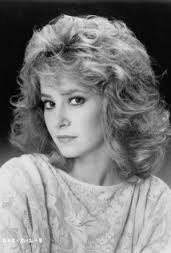
DEADLY DECEPTIONS
US, 1987, 100 minutes, Colour.
Lisa Eilbacher, Matt Salinger, Mildred Natwick.
Directed by John Llewellyn Moxey.
Deadly Deceptions is quite an effective popular thriller, focusing on a mother and her newborn child, her depression, her alleged suicide and the disappearance of the child. The film was directed by John Llewellyn Moxey, an English director of thrillers who moved to the United States in the '70s and directed many telemovies.
The film shows the attitude of the husband as he tries to track down the truth about his wife's death and find the baby that he is convinced is alive. He is helped by a newspaperwoman.
The film has an atmosphere of realism blended with premonitions and dreams. Quite enjoyable of its kind.
1. Popular telemovie thriller?
2. Locations, the country town, the ordinary way of life? The insertion of the dream sequences and premonitions? Musical score?
3. The title, indication of themes?
4. Jack and Lori and their marriage, their child? His work, her life at home? His dreams, her depression? Love of the baby? The ordinary day? Jack at work, the phone calls, the expected visit of his parents? Going home? His wife's disappearance? The news of her death?
5. Lori, at home, the phone call, the prize, her indecision, her going? Phone call to her mother-in-law? The eagerness, the trip, the love of the baby? Her disappearance? Found hanging?
6. Jack and the effect on him? The experience of the Coroner's Court? The friendship of the journalist? His parents' support? Convinced that the baby was alive? The various investigations? Meeting Anne Ross again? The pursuit of information? Documents? The suicide note? The hint about the town where the phone call came from? Bank records, discovering the criminals, the fight with them? Their patron, the visit to her? The discovery that he had been fostered to her? Going to his parents, discovering the truth? Going to confront the woman, her plea to him, love for him? Killing herself? The finding of his son again?
7. The newspaper reporter, her interest in the case, sympathy? Pursuing clues, the discovery about the pens in rooms? Origin of the phone call? Working with Jack in the investigation? Discovering of the truth, the battle with the criminals? The happy ending?
8. Jack's parents, their interest in their son, their grandson? Their reticence? Their reluctance to tell the truth? The story of the pregnancy, the father being away, the fostering of the child, the cruelty of the foster father? Getting the baby back?
9. The police, their collaboration, the research?
10. The criminals, their charade with the winning of the prize? Smooth manner? Their buying their property? The confrontation? The fight and deaths?
11. The foster mother, answering the phone? Her chauffeur and his part in the crime? The story of her marriage, love for the baby, having to let it go? Paying the money for its kidnap? Confrontation with Jack, the truth, her love for him? Killing herself?
12. The details of the plot and the detection, the clerk in the motel and the information about the pens? Bank records? The reality and the combination of the dreams? Hearing the sound on the telephone?
13. How plausible the plot? How emotionally involving? Themes of family and of love?
Published in Movie Reviews
Published in
Movie Reviews
Tagged under